Crocodiles and alligators, while often confused due to their similar appearances, are distinct in many ways.
This article explores their differences in detail, from physical characteristics to behaviors and habitats, providing a deeper understanding of these fascinating reptiles.
Differences between Crocodile and Alligator
| Crocodile | Alligator | |
|---|---|---|
| Snout Shape | V-shaped, pointed | U-shaped, broad |
| Teeth Visibility | Teeth in both upper and lower teeth visible when mouth is closed | Only upper teeth visible when mouth is closed |
| Size | Larger, can reach up to 20 feet in length | Smaller, typically around 11 feet in length |
| Color | Lighter, often olive green or brown | Darker, usually black or dark gray |
Crocodile vs Alligator: Snout Shape and Teeth
Alligators are easily recognized by their U-shaped, broad snouts. This design is not just for show; it’s perfect for crushing and gripping.
The wide, rounded shape allows alligators to break the shells of turtles and other hard-shelled creatures, making them effective predators in their swampy realms.
Additionally, when an alligator’s mouth is closed, its lower teeth are not visible. Their upper jaw is wider than the lower one, so the lower teeth fit neatly into sockets in the upper jaw, hiding them from view.

Crocodiles, on the other hand, boast a V-shaped, pointed snout. This sleek design is tailored for a diet primarily consisting of fish. The narrow snout cuts through water with minimal resistance, allowing crocodiles to snap up fish swiftly.
Unlike alligators, when a crocodile’s mouth is closed, some of its teeth, especially the fourth tooth on each side of the lower jaw, remain visible. This is because their upper and lower jaws are the same width, so the large teeth in the lower jaw stick out over the upper lip, giving them a more menacing appearance.
Crocodile vs Alligator: Size
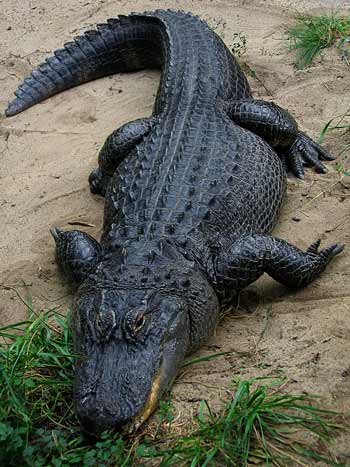
In the size department, alligators are generally smaller. An adult alligator typically reaches about 11 feet in length. Despite being smaller, they are still robust and powerful creatures, commanding respect in their habitats.
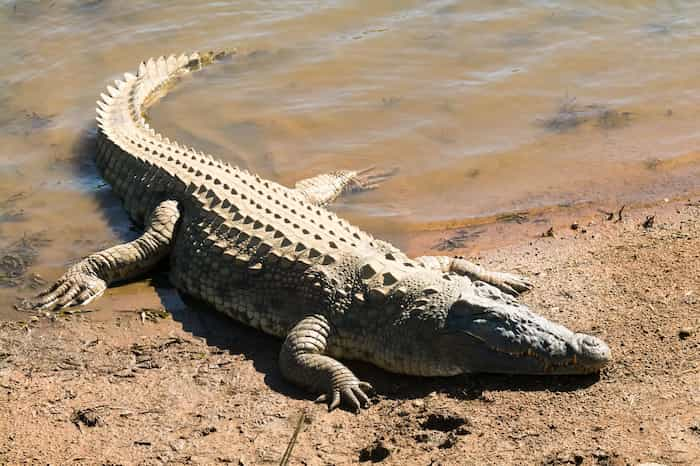
Crocodiles, however, take the lead in size. Some species, like the formidable Saltwater and Nile crocodiles, can grow up to an impressive 20 feet. This larger size grants them not just a physical advantage in their ecosystems but also a certain awe-inspiring presence.
Crocodile vs Alligator: Color
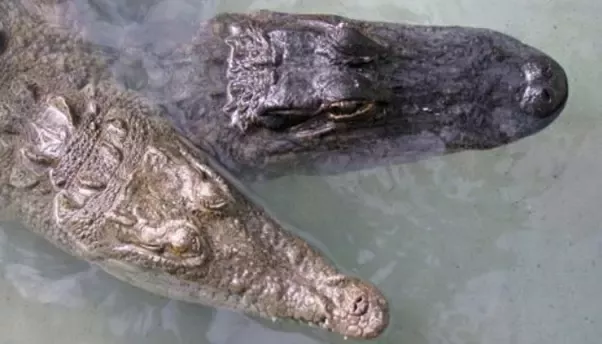
Alligators usually sport a darker, almost black hue. This coloration is an excellent adaptation for blending into the murky waters of rivers and swamps, providing them with an element of surprise against their prey.
Crocodiles, in contrast, are often olive green or brown. This lighter coloration is suited to a range of environments, from riverbanks and estuaries to mangroves, offering them effective camouflage.
Habitat
Alligators are primarily found in the freshwater environments of the southeastern United States and parts of China. They thrive in swamps, marshes, rivers, and lakes, where calm waters abound with prey.
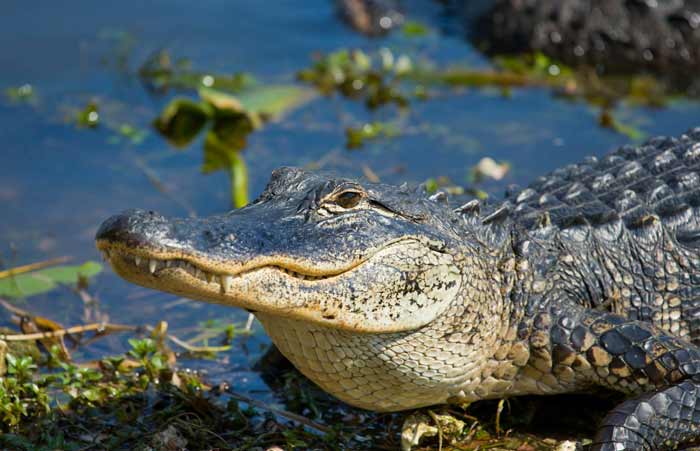
Crocodiles have a more extensive range, inhabiting regions in Africa, Asia, the Americas, and Australia. Their adaptability to both freshwater and saltwater environments, including rivers, lakes, wetlands, and coastal estuaries, highlights their ecological versatility.
Behavior
Alligators generally exhibit less aggression compared to crocodiles. They tend to avoid human interaction and often retreat when confronted. However, they can display aggression if provoked or during nesting season.
Crocodiles are known for their aggressive and territorial nature. They are less likely to back down in a confrontation, making them more dangerous, especially in regions where they coexist with human populations.
Diet
Both species are apex predators with similar carnivorous diets. However, their prey choices are influenced by their physical attributes. Alligators, with their powerful jaws, are adept at crushing fish, turtles, and small mammals.
Crocodiles have a more diverse diet, preying on larger mammals and birds, thanks to their greater size and strength.
Lifespan
Alligators enjoy a lifespan of about 30 to 50 years in the wild. This impressive longevity is a testament to their survival skills and adaptability in their natural habitats.
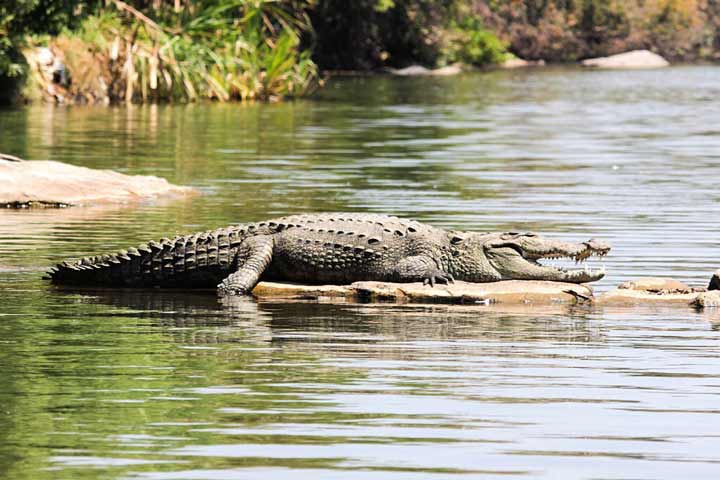
Crocodiles often outlive alligators, with some species reaching ages of 70 to 100 years. Their extended lifespan is attributed to their robust physiological adaptations and ability to thrive in diverse environments.
Interaction with Humans

Alligators occasionally encounter humans, primarily in the southeastern United States. While potentially dangerous, especially when provoked, they generally avoid initiating attacks and prefer to keep their distance from human activities.
Crocodiles pose a greater threat to humans, particularly in regions like Africa, Asia, and Australia. Their aggressive behavior and proximity to human settlements have led to numerous encounters, some of which have been fatal. This makes crocodiles a significant concern in areas where they are prevalent.
Crocodile vs Alligator: Who Would Win?
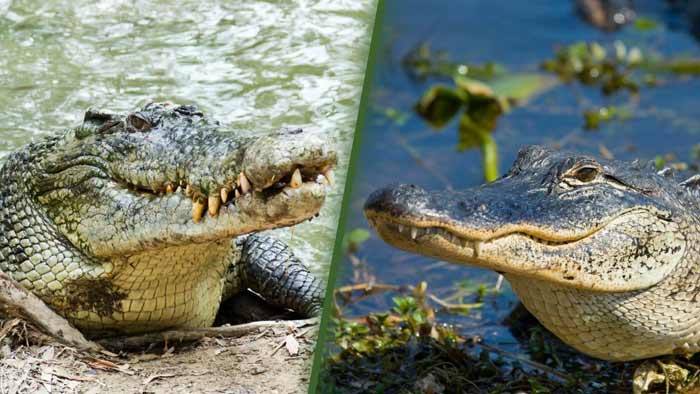
In a hypothetical battle, the crocodile would likely have the upper hand due to its larger size, greater strength, and more aggressive nature.
However, such encounters are rare in nature, and this scenario is more a topic of curiosity than a reflection of actual wildlife behavior.
Conclusion
Crocodiles and alligators, each with their unique adaptations and characteristics, play vital roles in their ecosystems.
Understanding their differences enhances our appreciation of these magnificent reptiles and underscores the importance of their conservation.
While they share many similarities, their distinct traits make them fascinating subjects of study and admiration.
FAQs
The key differences include snout shape (V-shaped for crocodiles, U-shaped for alligators), size (crocodiles are generally larger), color (crocodiles are lighter, often olive green or brown, while alligators are darker), and behavior (crocodiles are more aggressive).
Yes, in crocodiles, some teeth in the lower jaw, especially the fourth tooth, are visible when the mouth is closed, unlike in alligators.
Crocodiles are generally considered more dangerous due to their aggressive nature and tendency to inhabit areas closer to human settlements.
Crocodiles can live up to 70-100 years, while alligators have a shorter lifespan of about 30-50 years.
In a hypothetical fight, a crocodile would likely win due to its larger size, greater strength, and more aggressive nature, but such encounters are rare in the wild.
From a distance, you can often tell them apart by their snout shape and color. Crocodiles have a more pointed V-shaped snout and are lighter in color, while alligators have a broader U-shaped snout and are darker.



